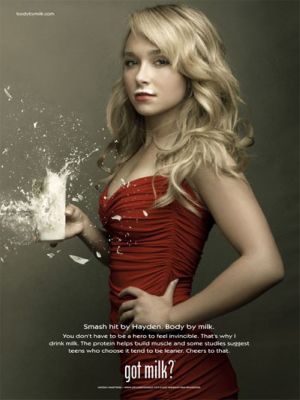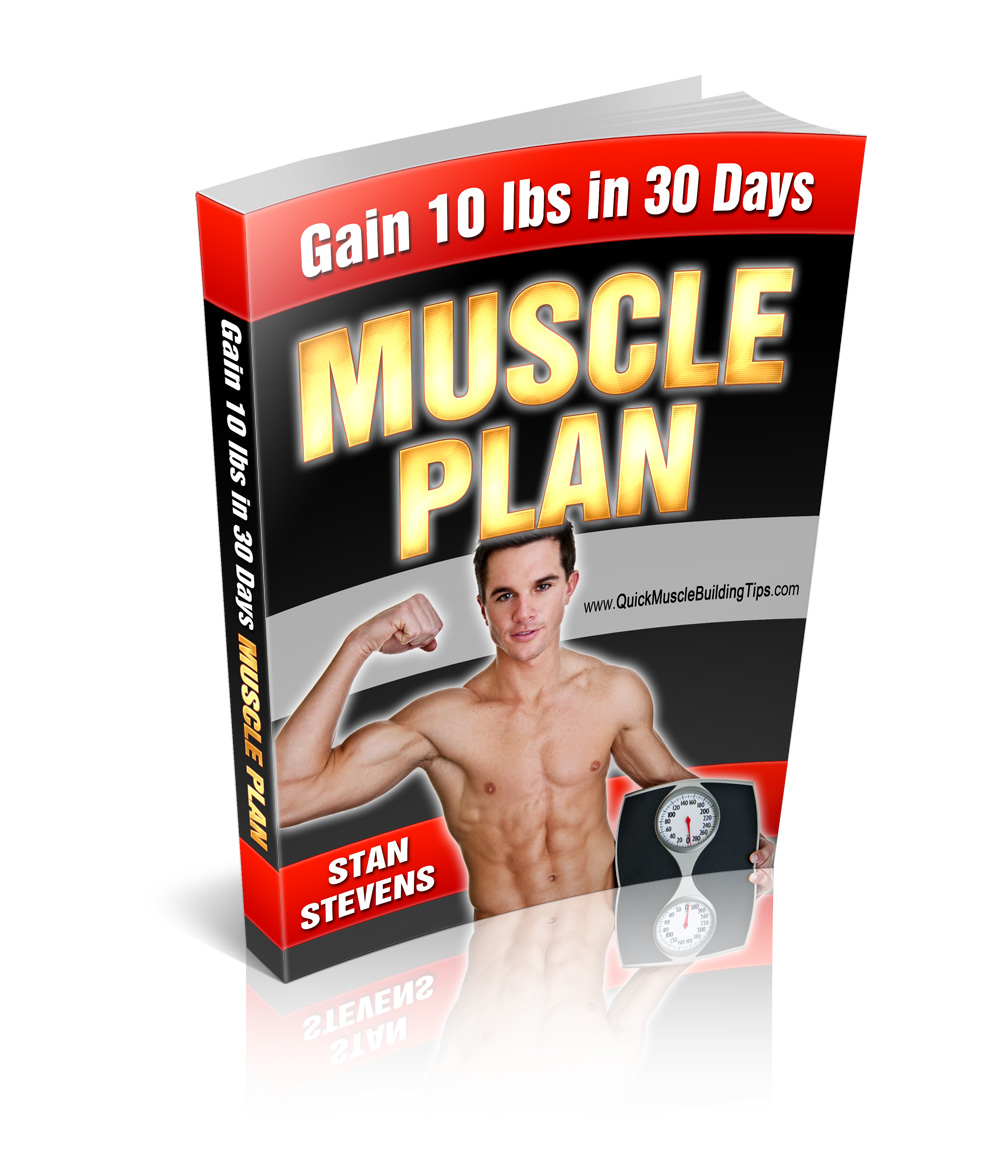We’ve all heard that milk does a body good. Well is that just marketing or a lot of B.S. So many different opinions are out there about if milk helps build muscle but I found a great article from stronglifts.com about it.
Check this article out here.
========
 Post workout nutrition is crucial for muscle recovery & rehydration. The common advice is to have whey after a weight lifting session because it’s a fast protein. You want to get protein in your muscles as fast as you can for recovery.
Post workout nutrition is crucial for muscle recovery & rehydration. The common advice is to have whey after a weight lifting session because it’s a fast protein. You want to get protein in your muscles as fast as you can for recovery.
Truth or marketing from supplement companies? Fact is that many weight lifters have used milk as a post workout drink for years. After reading this post you’ll know why it’s the ultimate post workout food for many people.
Milk Content. 1 cup (250ml) whole milk contains 8g protein, 13g carbs & 8g fat for a total of 150kcal. 1 cup also has 290mg calcium & 107g sodium. This combo makes milk perfect for lean body mass gains & recovery. Full content:
- Casein. Slow digesting protein. Milk consists for 80% of casein, a dairy protein that keeps you full longer and helps fat loss & muscle repair.
- Whey. Fast digesting protein. Milk consists for 20% of whey which helps muscle repair. This is the same kind of whey you find in protein shakes.
- BCAA. Milk is rich in branched chain amino acids : leucine, isoleucine and valine. A diet rich in protein, especially dairy protein like milk, will get you plenty of BCAAs. No need to waste your money on supplements.
- Carbs. Milk contains lactose. Your body uses this sugar to replenish your energy stores. Some can’t digest lactose. Check the tips at the bottom.
- Fat. Unless you go fat-free, milk contains 1 to 3g fat per 100ml. Fats digest slowly and keep you full longer, thus decreasing hunger.
- Calcium. Dairy calcium increases fat loss & improves bone health. The latter is especially important if you’re a woman (osteoporosis).
- Water. Milk is about 87% water. Proper hydration improves muscle recovery and can increase strength by preventing fatigue & stalling.
- Electrolytes. Milk contains sodium & potassium. These minerals improve re-hydration by retaining the fluids you consume post workout.
- Nutrients. Biotin, magnesium, vitamin A, vitamin B-12, vitamin D, vitamin K, riboflavin and many others (naturally or through fortification).
5 Reasons You Should Drink Milk Post Workout.
- Muscle Gains. Research shows a mix of slow and fast digesting protein is superior for lean body mass gains. Milk is 80% casein, 20% whey.
- Fat Loss. Dairy calcium increases fat loss. The fat in milk keeps you full longer which decreases hunger and thus helps you to lose fat.
- Recovery. Milk is a fluid and has electrolytes. Research shows milk is superior to water and sport drinks for rehydration post workout.
- Cheap. When you consider the protein (whey/casein/BCAA) and calorie content of milk, it’s one of the cheapest foods available.
- Easy. Milk requires zero preparation. 1 quarter (1 liter) milk can be a perfect post workout meal depending on your daily caloric needs.
Milk vs Whey. Some people still believe you need whey post workout. Probably because supplement companies keep pushing it. But studies show slow protein OR a mix of slow & fast protein is superior for lean body mass gains.
Whey is a fast protein. While milk is a combination of slow & fast protein (casein & whey). That’s why milk post workout is superior to whey but also to soy milk for lean body mass gains: whey & soy milk are fast digesting proteins.
If you don’t drink milk, the point is that a slow OR mix of slow & fast protein is better post workout. So even meat, poultry or fish is better than whey. Turns out many people have used solid meals post workout with success.
I haven’t used whey since a long time. I have milk post workout and/or a solid meal that consists of meat, grains & some fats. Exodus shared in this post that he got ripped using a similar kind of post workout meal.
Milk vs Sports Drinks. Strength training causes water loss through sweating. Rehydration is crucial for muscle recovery since dehydration can cause stalling. Signs of dehydration: fatigue & headaches (think hangovers).
Studies show milk is superior to water and sport drinks for rehydration. Here’s why: milk is rich in sodium & potassium which retain fluid, but also in protein & fat which slow digestion. Less hunger, longer hydration.
I don’t recommend sport drinks if you do strength training. Their sugar content will make you fat. Have a solid meal and/or milk and drink plenty of water post workout. Sport drinks are for endurance athletes, not weight lifters.
Whole Milk vs Fat Free Milk. Studies show whole milk causes more lean body mass gains than fat free milk. Since slower protein is better post workout, this could be why whole milk is superior: its fat content could slow absorption.
The fat in whole milk makes it tastier than fat free milk & keeps you full longer. So you’ll tend to eat less with whole milk and be less hungry. Although the fat content in whole milk can be an issue since it’s more caloric dense.
- Whole milk: 30g protein, 40g carbs, 35g fat, 600kcal.
- Low fat milk: 30g protein, 40g carbs, 10g fat, 370kcal.
- Non fat milk: 30g protein, 40g carbs, 0g fat, 280kcal.
- Low fat choco milk: 30g protein, 115g carbs, 10g fat, 670kcal.
Nutritional values are for 1 quart (1 liter) milk.
Milk Recommendations for Fat Loss. To lose fat, you need to eat less calories and/or burn more calories. Milk won’t make you fat. Neither will the fat content in fatty milk make you fat. Only excess calories cause fat gains.
Smoothing is possible when introducing milk in your diet (read below). But this isn’t fat gain. No food can make you fat if you have a caloric deficit. Just like any food, including protein, can cause fat gains when you have a caloric excess.
Research clearly shows that whole milk causes more lean body mass gains than non fat milk. Which proves fat doesn’t make you fat. Excess calories do. As long as you have a caloric deficit, it doesn’t matter if you drink non fat or whole milk.
So which milk you should drink post workout depends on your caloric needs for fat loss, which depend on your body-weight most. Example:
- If you’re 220lbs, you need about 2800kcal/day to lose fat. 1 quart whole milk post workout leaves room for 2200kcal the rest of the day.
- But if you’re 160lbs, you need about 1900kcal/day for fat loss. 1 quart whole milk only leaves 1300kcal. Or only 325kcal/meal if you eat 4x/day. Smaller meals don’t fill your stomach and could cause hunger.
So if you’re on the lighter side and need to lose fat, you have 2 options:
- Drink smaller quantities whole milk: 1 cup has 150kcal, 2 cups 300kcal.
- Drink low fat milk: 1 quart has 370kcal, 2 cups 185kcal.
Everything depends on your caloric needs for fat loss. Rule of thumb: 13kcal/lb of body-weight (or 11kcal/lb if you’re a woman). Do the math and make the milk fit within your caloric needs.
I recommend low fat milk over non fat milk because the difference in calories is insignificant. Low fat milk has only 90kcal more when you drink 1 quart and only 45kcal more when you drink 2 cups. Not a big deal.
On top of that, research shows that fattier milk causes more lean body mass. So drink low fat milk if you can’t make whole milk fit in your diet. Remember to drink milk post workout only if you follow the 8 nutrition rules, milk has carbs.
Milk Recommendations for Weight Gain. To gain weight, you need to have a caloric excess: eat more calories and/or burn less calories. Since burning less calories is hard to do, this means you have to eat more.
So it makes sense to drink 1 quart whole milk post workout: more calories and according to research more lean body mass gains. A more extreme version of this is obviously GOMAD: gallon of whole milk a day.
Chocolate milk could work too calorie wise. But it could be less effective than whole milk since it has less fat. Chocolate milk also seems to constipate.
Quick Tips. Some people can’t digest lactose. And many people experience smoothing from milk which they always mistake for fat gains. Tips:
- Lactose Intolerance. Take lactase pills with your milk if you get gas or diarrhea. Avoid lactaid-free milk: it’s convenient but more expensive.
- Smoothing. Milk is rich in sodium. Going from low to high sodium intakes causes water retention. Solution: increase your sodium intake. Eat more dairy products, eat pickles, supplement with real sea salt.
Athletes and coaches alike are recognizing the benefits of refueling with lowfat chocolate milk. Nick Folker, USA Swimming Trainer and Head Strength and Conditioning Coach at the University of California, makes chocolate milk a staple on the training menu of his swimmers. “Lowfat chocolate milk delivers the things my athletes really need to recover so they can get the most out of their next workout,” said Folker. “It has the right carb to protein ratio scientifically shown to help the body recover, high-quality protein to help repair muscles and fluids and electrolytes to replenish what’s lost in sweat. It’s so simple, plus it tastes great!”
A growing body of research supports chocolate milk’s recovery benefits after strenuous exercise. Most recently, a study published in the journal Medicine & Science in Sports & Exercise suggests that recovering with chocolate milk can give runners a performance edge. Researchers from Connecticut State University, University of Connecticut and Eastern Michigan University, found that when recreational runners drank fat free chocolate milk after a strenuous run, they ran 23 percent longer during a subsequent exercise bout later that day and had a 38 percent increase in markers of muscle building compared to when they drank a carbohydrate-only sports beverage with the same amount of calories.(1)
The Official Refuel Beverage of Athletes Everywhere
Through a variety of initiatives – and with the help of elite athletes, their trainers and sports dietitians – the “my After” campaign will reach active adults who are serious about their sports to educate them about the importance of recovering effectively:
As the Official Refuel Beverage of the Rock ‘n’ Roll Marathon Series, Ironman, USA Swimming, Life Time Run, and the Challenged Athletes Foundation®, the REFUEL | “got chocolate milk?” campaign will refuel athletes at endurance races, swim meets, charity races and health clubs nationwide.
Source: Marketwatch.com
=======
So do you have your milk to build muscle? What are your thoughts on milk to build muscle?
Leave a comment below.
|
Gain 10lbs of Muscle in 30 Days?
Grab this free Muscle Gaining Plan that includes the workout and diet plan. Just Enter Your Email Below.
|

|

|
We hate spam just as much as you
|


{ 0 comments… add one }